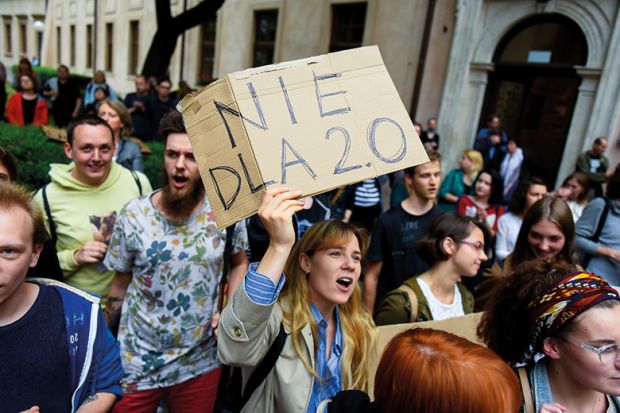After triggering the biggest student protests seen in Poland since the fall of communism, controversial plans to reform higher education in the country are set to pass into law.
Academics had warned, in the words of Mateusz Laszczkowski, assistant professor of political and economic anthropology at the University of Warsaw, that the draft Law on Higher Education and Science – known as Law 2.0 – reflected both “Poland’s broader authoritarian turn” and “the sweeping neoliberalisation of academia across Europe”.
Attracting particular concern were proposals to diminish the power of university senates made up of students and staff in favour of new university councils whose membership would have had a majority of individuals from outside the institution. These would have the power to set the university’s strategy and appoint the rector, with critics warning that appointees to the panels were likely to be “corporate representatives and politicians”.
Following protests that included the occupation of the official residence of the University of Warsaw’s rector, and disquiet within the ruling Law and Justice party, several amendments to the legislation were made by Poland’s lower house, the Sejm.
Key changes include stating that people from outside a university must constitute “at least 50 per cent” of the council memberships, allowing university members to potentially hold 50 per cent themselves. Rather than approving the university strategy, the council will now only have the power to “give its opinion” on the document. The councils will no longer have the “exclusive right” to propose rectoral candidates, and the winning candidate will be selected by a college of electors, not the council.
But, for Dr Laszczkowski, “the essence of the reform appears unchanged”.
“The amendments are a compromise that’s a result of internal struggles inside the Law and Justice party, rather than a substantial response to the protests,” he told Times Higher Education. “The reform evacuates democracy from academia – what little democracy is left – by centralising power in the rectors’ hands. [And] it further subjects academia to the interests of big business.
“Even if the councils would not be as powerful and as explicitly business-dominated as in the original proposal, the reform is still a powerful push in that direction. The risk is that universities may be gradually reduced to business schools, producing corporate cadres but no free thinkers.”
According to Poland’s Ministry of Science and Higher Education, the amended law makes many universities’ rights – such as the power to award degrees – dependent on the scores that they receive in assessments covering areas such as research performance. Additional funding will be available for the top-performing institutions.
The law also gives rectors more power over university budgets, allowing for public funding to be allocated to the institution as a whole, rather than individual faculties, and aims to create doctoral colleges in universities that would offer scholarships to postgraduates.
Weronika Grzebalska, a PhD candidate at the Polish Academy of Sciences’ Graduate School for Social Research, agreed that the amendments were “mostly cosmetic and not systemic” and that the law would “turn higher education as we know it upside-down”.
Alongside the “de-democratisation” of universities, Ms Grzebalska was concerned that the importance attached to universities’ ratings would mean that “smaller universities outside metropolises will be extremely underprivileged, their cadres will migrate elsewhere, their educational offer will shrink, and they will cease to play an important role in their local communities.”
Ms Grzebalska also pointed to two areas where the ministry seemed to have responded to the wishes of illiberal forces. One was a decision to separate theology from the rest of the humanities, “so that people working in this discipline will not have to compete with other disciplines for money”, which she described as a “clear bow to the Church” by the government.
Even worse was a provision, introduced at the request of the Minister of Family, Labour and Social Policy, which meant that there would be different retirement ages for men (65) and women (60) among contracted academic staff.
This was, Ms Grzebalska said, “a very harmful move that will further discriminate against women in academia”.
POSTSCRIPT:
Print headline: New Polish law sparks fears
Register to continue
Why register?
- Registration is free and only takes a moment
- Once registered, you can read 3 articles a month
- Sign up for our newsletter
Subscribe
Or subscribe for unlimited access to:
- Unlimited access to news, views, insights & reviews
- Digital editions
- Digital access to THE’s university and college rankings analysis
Already registered or a current subscriber?








